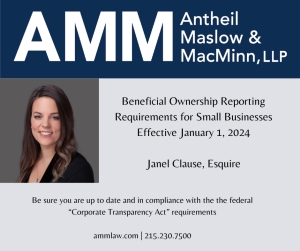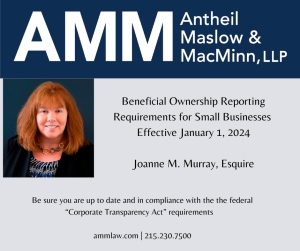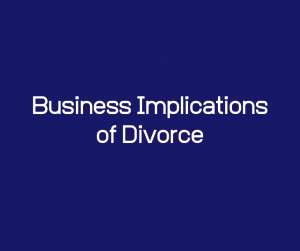As Promised: Beneficial Ownership Reporting Requirements Went Into Effect January 1, 2024
For the past couple years, we warned you in our business law blog that this time would come. It’s here; the federal Corporate Transparency Act (the “Act”), requiring many businesses to report beneficial ownership information about their owners and anyone with substantial control of the company, went into effect on January 1, 2024. This means that any “reporting company” in existence prior to January 1, 2024 has until January 1, 2025 to report; any reporting company that was formed on or after January 1, 2024 but before January 1, 2025 has 90 days after formation to report; and any reporting company formed on or after January 1, 2025 has 30 days after formation to report.
It should be noted that on March 1, 2024, the United States District Court for the Northern District of Alabama held that the Act was unconstitutional because Congress exceeded its authority. National Small Business United d/b/a the National Small Business Association, et al. v. Yellen, Case No. 5:22-cv-1448-LCB. The Financial Crimes Enforcement Network (FinCEN), the agency overseeing the administration of the Act, has announced that it will abide by the court’s order for as long as it remains in effect. This means that it will not seek enforcement against the plaintiffs in the case (Isaac Winkles, reporting companies of which Mr. Winkles is a beneficial owner or applicant, and members of the National Small Business Association as of March 1, 2024). It seems likely that this decision will be appealed. In the meantime, we encourage all entities formed after January 1, 2024 (other than those who were members of the National Small Business Association as of March 1, 2024) to comply with the Act given the 90-day compliance period. Entities already in existence on January 1, 2024 may want to await further developments given that their compliance deadline is months away.
They Are Here: Beneficial Ownership Reporting Requirements for Small Businesses Go Into Effect January 1, 2024
Last year, we warned you in our business law blog that a new law, the federal Corporate Transparency Act, would be going into effect that would require many businesses to provide information about their owners and anyone who controls the company to the federal government. We now know that this law will take effect on January 1, 2024. Reporting companies in existence prior to that date have until January 1, 2025 to comply; companies formed on or after that date must comply within 30 days after formation. Once the data has been entered, companies are obligated to update any information that becomes outdated or is incorrect. The information will be included in a database that will be used to combat money laundering, financing of terrorism, and other illegal activities.
The ESG Backlash: Politics and Shareholder Primacy
Reprinted from the April 2023 edition of Business Law Today. Further duplication without permission is prohibited.
By Susan A. Maslow
In the late 2010s and early 2020s, ESG—a wide-capturing acronym standing for “environmental, social and governance”—roared into action, emerging both domestically and abroad as one of the defining trends in investing, regulation, finance, and corporate governance.
ESG’s proponents have long sought a unified framework through which to describe interrelated standards of environmental sustainability and human rights, and bring them into greater alignment with the private sector’s traditional profit-seeking goals. This change in approach arguably gained in prominence after the Business Roundtable’s 2019 declaration on the purpose of the corporation, endorsing a vision of corporations being led for the benefit of all stakeholders, not just shareholders. Though many question the sincerity and commitment of the Roundtable, the ESG movement was super-charged, and it achieved mainstream status during the 2020 protests for racial justice, which spurred companies to integrate new goals for diversity, equity, inclusion, and racial justice into their broader ESG policies. Over the course of the last eighteen months, public company boards have been sued for breaches of fiduciary duty based on alleged failures to react to ESG factor “red flags.”
Coming Soon: Beneficial Ownership Reporting Requirements for Small Businesses
On January 1, 2021, Congress enacted the Federal Corporate Transparency Act (the “CTA”), pursuant to which a secure database will be established to assist law enforcement agencies in combatting money laundering, financing of terrorism, and other illegal activities. The objective of the CTA is to prevent bad actors from using shell companies to obscure the provenance of their ill-gotten gains.
The database will be administered by the Financial Crimes Enforcement Network (“FinCEN”), an agency of the U.S. Department of Treasury. Companies will be required to provide information relating to their beneficial owners (generally, individuals owning 25% or more) and persons who are in control (generally, individuals holding significant decision-making authority). There are exceptions, such as publicly traded companies, companies with annual gross receipts exceeding $5 million that have more than 20 full-time U.S. employees and a physical office in the United States, and companies already subject to Federal government oversight (e.g., banks).
No Safe Harbor in the “Contract Assurances” Required in the EU Directive Proposal
The European Commission published the long-awaited Proposal for a Directive of the European Parliament and of the Council on Corporate Sustainability Due Diligence (the “EU Directive”) on February 23, 2022. It has been suggested that text found in the EU Directive “risks making the law ineffective” by implying that companies can fulfil their obligations by simply adding clauses in their contracts with suppliers and verifying compliance with “suitable industry initiatives or independent third-party verification”. The criticism is that the “contractual assurances” and verification required by Items 2(b) and 4 of Article 7, and Items 3(c) and 5 of Article 8 allow companies to shift their responsibilities on to their suppliers and to knowingly get away with harm by conducting ineffective audits or participating in voluntary industry schemes that have failed in the past.
The argument that companies can find an easy safe harbor within the EU Directive is misguided. Such condemnation places undue emphasis on the first two elements to achieve the negation of civil liability under Article 22 and ignores the third factor. A company must prove not only that (i) it used appropriate contract clauses (under to-be-provided Commission guidance), and (ii) it verified compliance, but must also prove (iii) it was reasonable to expect the action taken, including the verification process, “would be adequate to prevent, mitigate, bring to an end or minimize the extent of the adverse impact.” The last element is unfairly discounted by those that fear delivery of a safe harbor to industry influences. In addition, due account is not given to Article 22’s additional text that insists company efforts (or absence of efforts) to remediate any discovered damage and the extent of pre-harm support and collaboration to address adverse impacts in its value chains (or absence of support and collaboration) is also to be considered in determining liability.
Articles 4 to 11, 25 and 26 of the EU Directive impose due diligence obligations on subject companies and address the duty of care required of their directors in setting up and overseeing due diligence. The EU Directive has numerous “Whereas” clauses expressing a desire to incorporate the UNGPs and OECD Guidelines which require shared responsibility between buyers and suppliers. It should not be read as suggesting companies avoid liability by simply demanding conventional representations and warranties from a first-tier supplier without shared responsibility for thorough retrospective and prospective investigations to identify, prevent and end adverse impact. Any company that believes “contract assurances” without a detailed and regularly reviewed corporate strategy to address human rights, climate change and environmental consequences using contracts as one of multiple tools is destined to be found liable for damages.
Perhaps Article 22 with respect to a company’s potential civil liability could be clearer with respect to this point if it included a reference to Articles 4,5 and 6 in lieu of the existing limited reference to the obligations laid down in Articles 7(Preventing potential adverse impacts) and Article 8 (Bringing actual adverse impacts to an end). But Article 12 (Model contract clauses) of the EU Directive includes a promise that the Commission will provide guidance for model contract clauses and Article 13 (Guidelines) states the Commission, in consultation with Member states, stakeholders, the European Union Agency for Fundamental Rights, the European Environment Agency, and appropriate international bodies may issue guidelines for specific sectors or specific adverse impacts. The to-be-developed model contract clauses should reflect the characteristics and obligations found in Version 2 of the Model Contract Clauses (the “MCCs”) drafted by the American Bar Association Business Law Section’s Working Group found here Center for Human Rights. The MCCs include provisions which require:
● a joint responsibility by buyer and seller to engage in human rights due diligence, in line with the UNGPs and the OECD Guidance;
● a commitment by buyer to engage in responsible purchasing practices that will support supplier’s obligations to avoid adverse human rights impacts; and
● in the event of an adverse impact, a joint commitment that: (a) the parties will prioritize victim-centered human rights remediation above conventional contract remedies (that compensate the non-breaching party, not victims); and (b) each party’s participation in remediation shall be proportionate to each party’s causation of or contribution to the adverse impact.
The EU Directive and the right contract clauses and due diligence guidance can change the way supply chains in global markets have worked for centuries. Finally, a real tool to address modern slavery and the environmental destruction of entire communities.
Balancing Buyer and Supplier Responsibilites in International Supply Chains
Model Contract Clauses to Protect Workers in International Supply Chains, Version 2.0
A working group formed under the American Bar Association (ABA) Business Law Section has announced a revised set of model contract clauses for international supply chains. The 2021 Report and Model Contract Clauses, Version 2.0 (MCCs 2.0) from the Working Group to Draft Human Rights Protections in International Supply Contracts are now finalized and can be found on the ABA Center for Human Rights site. The MCCs 2.0 are one of several initiatives within the Business Law Section’s implementation of the ABA Model Principles on Labor Trafficking and Child Labor. The MCCs 2.0 are offered as a practical, contractual tool to assist inside and outside corporate counsel in efforts to reflect their clients’ commitment to stated human rights policies and desire to abide by international human rights soft and evolving hard law. Given the likely European Union and United Kingdom implementation of mandatory human rights due diligence, the mounting number of Withhold Release Orders in US ports, and growing investor concern with respect to environmental, social and governance (ESG) liability, the Model Contract Clauses should be of interest to all companies with complex supply chains and those that provide such companies legal services. Designed as a modular, practical tool for corporate counsel, the 2021 MCCs 2.0 are the first model contract clauses to implement “human rights due diligence” obligations in supply contracts. They attempt to integrate the principles contained in the UN Guiding Principles on Business and Human Rights (the “UNGPs”) and the OECD Due Diligence Guidance for Responsible Business Conduct into international contracts. The MCCs translate these principles into contractual obligations that require buyer and supplier to cooperate in protecting human rights and make both parties responsible for the human rights impact of their business relationship.
2021 Decennial Report Requirements for Pennsylvania Entities
In 2021, entities formed in Pennsylvania and entities formed in other states that have registered to do business in Pennsylvania must file a Decennial Report with the Department of State. This requirement applies to business corporations, non-profit corporations, limited liability companies, limited partnerships, and limited liability partnerships. If a report is not filed, the entity will no longer have exclusive use of its company name or trade name and the name will become available for others to use it. While an entity can file after the December 31, 2021 deadline, a third party registering with the name during the gap period will have rights to the name, and the original entity will not be permitted to reinstate its exclusive rights to the name.
Earlier this year, the Department of State mailed notices to the registered address for each entity regarding its name, however, you should not rely on receiving such a notice to determine whether or not you have to file. All entities are required to file unless they made new or amended filings between January 1, 2012 and December 31, 2021.
The required forms can be found on the Department of State website at https://www.dos.pa.gov/BusinessCharities/Business/Resources/Pages/Decennial-Filing.aspx. There is a filing fee of $70, and the filing deadline is December 31, 2021.
If you are not sure whether you need to file this report for your entity, or if you have any questions regarding this requirement, feel free to contact us. We caution you not to rely upon the Pennsylvania Department of State’s website search feature to tell you whether or not your entity is required to file the decennial report.
Business Implications of Divorce
When a business owner gets divorced, the business is often the major asset subject to distribution. Accordingly, the business and its’ ongoing operations are almost always implicated in the divorce. In most cases that I see, the business is a small business with one owner or a few owners. In the best case scenario, the business owners have planned in advance for situations that arise in a divorce through a Shareholders Agreement, Prenuptial Agreements and/or Postnuptial Agreements. Hopefully, the parties’ respective family law and business law attorneys can work together to best protect the business owner to ensure as smooth a transition as possible. Hopefully, the relevant agreements have set forth a valuation formula which can be upheld at law for purposes of the divorce. Counsel can also work together to insure that income is clearly defined and reported so that support is less contentious. Additionally, advance planning can be used to address the below issues so that a divorce does not mean the end to the business. While advance planning is not a guarantee, it will provide additional protections to the business owner.
A divorce can impact internal and external business relationships, support (between spouses and child support), equitable distribution (division of marital property) and business control. In terms of business relationships, banking relationships can come into play, especially if the spouse is a personal guarantee of the loan. It is often not easy or possible to have the spouse removed from the guarantee. The spouse may also have a role in the business and it may not be feasible for them to remain involved. For example, in cases where the spouse is client facing, a delicate balance will be necessary to transition the spouse out of the business without negatively impacting the business. This can be a challenge if the divorce is acrimonious. Finally, the roles of the parties within the business may create sustainability issues going forward. In some cases, one spouse has a particular talent (i.e. software development, marketing creativity or scientific knowledge) which cannot be easily replaced and without which the business may not be able to survive. Such issues impact valuation but also succession and strategy on distribution of assets.
As for support, when a business owner is a party to a support action, whether for support for a spouse or for a child, calculating income can be challenging. The definition of income for purposes of determining support is very broad and is not the same as taxable income. There can be practical issues in obtaining information and documents which reflect the income. Legal issues can also arise, such as whether income is being reported or if the court can compel income or retained earnings to be distributed from the business to the owner to pay support.
In equitable distribution, the business must be valued so that division of the assets can occur. Business control also comes into play. It is unusual for parties to retain joint ownership or for the non-business owner spouse to receive shares of the business so creativity and/or structured payments are often necessary unless there is enough cash reserved for an outright payment. The payout can cause a financial strain for the business.
To best protect a business in the event of a divorce of the business owner, it is advisable for business owners to have advance planning through the mechanisms listed above. While not a guarantee, it will place the business owner spouse in a much better position than ignoring these issues all together.
The Spark Bowl at Delaware Valley University: A Business Lawyer’s on Take Entrepreneurship
As a business lawyer, I have spent years counseling small to mid-sized companies across a wide range of industries. I have advised clients on routine to complex business legal issues that arise during the start-up stage through operation and growth stages, and have structured many exit strategies and created successful succession plans in various ownership documents. What I love best about providing sound legal guidance to business owners through the life cycle of their business is helping them solve issues that arise both from a legal perspective and also from a financial perspective. Helping clients navigate through contractual, employment, finance, IP protection, and other daily issues so they can focus on achieving their goals of growth, maximization of profits, and sustainability, all while minimizing their potential for risk and exposure is a vital objective in my practice.
I have recently been invited to participate for the next several weeks as an advisor in an exciting new local event – The Spark Bowl. Co-sponsored by Delaware Valley University, it’s Small Business and Entrepreneurship Center and the Central Bucks Chamber of Commerce, this event is a local competition aimed at fostering innovation, growth, and entrepreneurship. At the First Annual Spark Bowl event to be held on December 11th, students and local entrepreneurs in and around Bucks County will “pitch” their businesses plans to Spark’s judges, who will select a winner who will receive prizes and benefits to include monetary funding as well as access to expert advisors. The contest will be judged by experienced investors who have a desire to support innovation and economic growth and prosperity within the local community. As part of DelVal’s experiential learning program, DVU student teams will work with final contestants to prepare for the competition under the guidance of DelVal faculty and SBEC advisors. Professor William Viel of DVU’s Business and Information Management Department is the Director of the SBEC. It is quite a valuable resource to this community to have such an incubator right here in Central Bucks. Please click here to learn more about The Spark Bowl at Delaware Valley University.
After many years of working with business owners, some who were successful, and some who were not, it seems evident that the best predicator of sustainable business growth and success is: planning by asking the right questions up-front; creating detailed business plans and product or service models; determining the expected demand for their product or service in a low or highly competitive market; understanding both traditional and non-traditional financing alternatives; putting together the right team of professionals to help them produce, deliver and promote their business and its products/services; dealing with operational challenges and various levels of legal compliance properly, all while being willing to assess weaknesses and promote strengths.
The Spark Bowl has inspired me to remind my clients to think about why they are doing what they are doing, as they work through the day-to-day challenges (legal and otherwise) of operating and sustaining a business they built and love.
Good Luck to all the participants on December 11th!
From a Litigator’s Desk: Minority Business Ownership – Know Your Limits
Many an article or blog post concerns minority shareholder rights, shareholder oppression or shareholder “freeze out”. As business and litigation lawyers, we are always mindful of the rights between and among business owners, what can and cannot be done in furtherance of those rights and the legal mechanisms applicable to the exercise of those rights. We frequently write on the strategies available to a minority shareholder such as examination of books and records, claims of breach of fiduciary duty and the potential for appointment of a corporate receiver or custodian.
This is not that article.
The fact is, being a minority shareholder means that, by definition, there are often things you simply cannot control. A shareholder or member in a business entity who possesses less than a controlling stake must have reasonable expectations as to the rights attendant to such ownership and understand the limits of such rights so as to make informed decisions concerning the investment of time, energy and money in pursuit of the collective enterprise.
Let’s start with who owns the remaining shares in the company. In the absence of an agreement to the contrary, the majority shareholder is free to transfer the majority (said another way; controlling) interest in the company without the consent of the minority. A transaction can result in a change in control such that the minority shareholder suddenly works for someone entirely new. While a minority shareholder can enjoy “dissenter’s rights”, such rights are applicable in very narrow situations specified by statute. In fact, in the absence of a prohibition, the stock in a business entity is readily transferrable, just like on an exchange, if a buyer and/or seller can be identified.
Internally, a minority shareholder can find it difficult to impact the direction of the business. Depending on the by-laws of the entity and, frankly, the will of the majority, a minority shareholder may or may not have a voice on the board of directors and thus may not possess a vote on material decisions such as the persons who will fulfill critical roles in the executive branch of the business such as the officers of the corporation. More importantly, a minority shareholder may not have input on the financial operations of the company including distributions, financing arrangements, major purchases of inventory, equipment or talent. All of which can dramatically affect the annual bottom line.
Even employment is not guaranteed to a minority in interest. In the absence of an agreement to the contrary, the employment of a minority shareholder may simply be at will in the same way as the sales force, the administrative assistants or the custodian. Certainly, terminating a minority’s employment could be one of the factors argued in a freeze out, but in the absence of other factors, termination of employment alone may not give rise to a cause of action. Certain courts have suggested continued employment may be implicit in a “founder” but those situations are few and far between and a plaintiff/minority shareholder must be prepared with more to argue than the end of employment if freeze out is alleged.
In business, like politics, being in the minority means sometimes you are powerless to immediately change the course of the company. Sometimes, a group of shareholders can band together to pool their collective influence for their mutual benefit. Other times, the best strategy is to become the majority even when the acquisition of additional shares comes at an unnecessary or unanticipated cost. Under any circumstances, rights afforded to the majority are not constrained solely because a minority shareholder does not agree with a particular course of action.
As a litigator, I am often contacted by minority shareholders who are frustrated by their lack of control or influence. While the law offers certain protection for holders of such minority interests, those remedies are factually limited and are often unsatisfactory even if granted in full after significant expense in litigation. Certainly an appropriate agreement outlining the respective rights and obligations can change the analysis. Business owners should consider, and plan for, what rights their stake in the company provides.




























